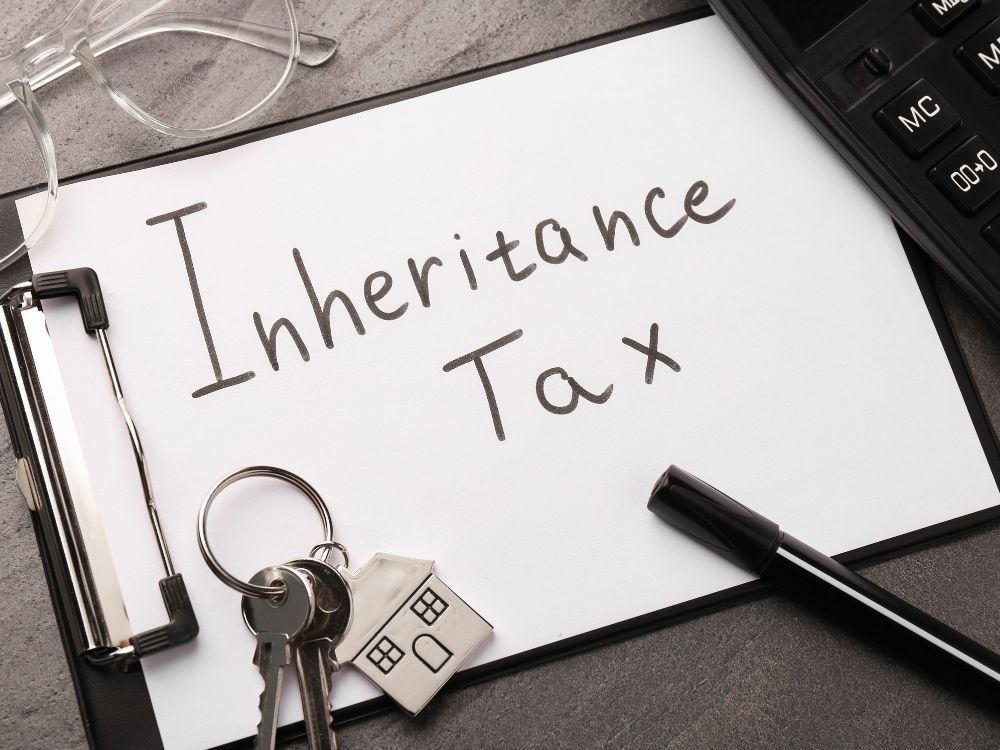Introduction: “They’ll Deal With It” A Dangerous Assumption
In this article, Steve Rowe explores the real cost of leaving inheritance tax to your family — not just financially, but emotionally and administratively. And, more importantly, what can be done now to prevent it.
As a financial planner, I’ve heard it many times — often from people who are otherwise meticulous in every other aspect of their lives. They’ve made a will, updated their pension nominations, maybe even spoken to their solicitor. But when it comes to inheritance tax planning, the conversation is quickly closed with a familiar phrase:
“My family can sort it out after I’m gone.”
On the surface, it sounds reasonable. After all, isn’t that what executors are for? Surely the forms can be filled, the tax paid, and the estate wound down — eventually. But in practice, this assumption is one of the most damaging choices a high-net-worth individual can make. Not because your family is incapable — but because they’re ill-equipped, under pressure, and navigating a process that’s far more complex than it appears.
IHT isn’t a passive tax. It’s deadline-driven, documentation-heavy, and full of technical detail that even accountants can struggle to navigate. And crucially, it’s not something to be sorted after your death. By then, many of the tools available to reduce or mitigate the tax burden are no longer available. What you leave behind may be an inheritance — but it could just as easily be a mess.

1. The Illusion of Simplicity
It’s easy to assume that inheritance tax is straightforward. You might believe that by writing a will, keeping your paperwork in reasonable order, and appointing an executor — often a spouse or adult child — the job is more or less done. The truth is more complicated.
Probate and inheritance tax go hand in hand, but they are distinct processes — and both come with their own legal responsibilities. Executors are not only responsible for paying the tax; they’re personally liable if they get it wrong. That includes undervaluing assets, missing declarations of gifts made in the seven years before death, or failing to apply the correct exemptions.
For wealthier estates, this isn’t theoretical risk — it’s a common and growing reality. The Office for National Statistics reports that the number of estates paying IHT has increased by over 30% in the last five years, in part due to frozen allowances and rising asset values. Property prices, business ownership, and even uncrystallised pensions can all push estates into taxable territory — often without the family realising it.
What’s more, many assume that joint ownership or “naming someone in the will” will allow for smooth transfer of wealth. But even joint assets can be subject to IHT, and being named as a beneficiary doesn’t exempt you from tax complexity.
If your estate includes multiple properties, a share portfolio, business assets, or even just ISAs and pensions spread across different platforms, the executor must gather valuations, complete IHT form IHT400, (and often supporting schedules), and pay the tax — usually within six months of death. And if cash isn’t readily available, HMRC’s deadlines don’t shift to accommodate your family’s liquidity.
“Inheritance tax isn't just a bill — it's a process. And it's one your family may be legally and emotionally unprepared for.”
– Luke James, Chartered Financial Planner - Lucent Financial Planning
2. Inheritance Tax Isn’t Passive It’s a Deadline-Driven, Legal Process
There’s a persistent myth that inheritance tax is somehow automatic — that it’s calculated and deducted behind the scenes, like PAYE. The reality is that IHT is a manual process, one which places legal and administrative responsibility squarely on the shoulders of the executor. And for most families, the executor isn’t a professional — it’s someone in mourning.
HMRC requires that any inheritance tax due is paid within six months of the end of the month in which the person died. Miss that deadline, and interest starts accruing daily — regardless of whether probate has been granted. In many cases, this is before the executor even has legal access to the estate’s assets.
This time pressure creates a cash flow problem. If the estate is made up of property, illiquid investments, or business assets, raising funds to pay the tax isn’t always straightforward. Executors may be forced to use their own money temporarily, seek a bridging loan, or negotiate with HMRC for staged payments. These arrangements take time, and without good planning, they add stress to an already overwhelming situation.
And then comes the paperwork.
For taxable estates, executors must complete the IHT400, a complex set of forms detailing all assets, liabilities, gifts made in the last seven years, and any relevant trusts. Each asset class may require a separate schedule — from life insurance and pensions to foreign assets and shareholdings. The forms must be supported by professional valuations and documentary evidence. Any omission or error can delay probate, trigger additional scrutiny, or lead to financial penalties.
Even when no tax is due — for example, when assets pass between spouses — a declaration must still be made. And if your estate includes business relief, agricultural relief, or a qualifying trust, additional schedules and specialist knowledge are required to ensure the right reliefs are claimed — and retained.
“IHT is not settled automatically. It has to be calculated, declared, evidenced, and paid — all under pressure and in grief.”
– Keely Woods, Chartered Financial Planner - Lucent Financial Planning

It’s also worth noting that HMRC’s approach has evolved. In recent years, there’s been a clear tightening of scrutiny around valuations, particularly for property and private company shares. Executors must be able to justify the numbers they submit — especially if they hope to claim IHT reliefs. Failing to do so can result in disputes, re-valuations, or investigations — all of which further delay the administration of the estate.
In short, IHT is not something your family can just "deal with later." It’s a technical, deadline-bound process with real legal exposure. And by the time they realise that, many of the tools that could have eased the burden — lifetime gifting, insurance in trust, asset restructuring — are no longer available.
3. You’ll Cost Them More Than You Think
There’s a certain irony in the mindset that assumes IHT can be left to the family: it often comes from a place of trust and good intention. The belief that “they’ll be fine” or “they’ll sort it” is framed as generosity. But in practice, the absence of forward planning frequently leads to avoidable cost — and not just emotional or logistical cost, but real financial loss.
Missed Reliefs
The most obvious issue is missed reliefs. There are several mechanisms within the IHT system designed to reduce tax — but only if the executor knows to claim them. Business Relief, Agricultural Relief, and the Residence Nil-Rate Band can significantly reduce the taxable value of an estate, but they are not applied automatically. In complex estates, claiming them often requires careful structuring in advance and specific declarations after death.
Taper Relief
Likewise, the system for taper relief on gifts made during your lifetime is often misunderstood or poorly recorded. If you gifted money or assets in the last seven years but didn’t maintain a clear record, your family may not know to declare it — or worse, may declare it incorrectly. Either outcome can increase tax or delay the grant of probate while HMRC investigates.
Interest & Penalties
Then there’s the issue of interest and penalties. If your estate is taxable and the family cannot pay the bill within the six-month window, HMRC begins charging interest — currently at 7.75% (as of 2025). That means a £300,000 IHT bill could rack up over £23,000 in interest in just one year. Penalties for errors or omissions can add further strain, especially where documentation is incomplete or valuations are challenged.
You may also inadvertently trigger avoidable tax by poor structuring. For example, an ISA left to someone other than a spouse becomes fully taxable, despite many assuming ISAs are IHT-free. Or a life insurance policy, not written in trust, becomes part of the taxable estate — increasing the very liability it was intended to cover.
And while many high-net-worth individuals intend to gift during their lifetime, few do it with strategic discipline. Gifting large sums without using exemptions or understanding the seven-year rule can reduce the size of your estate but offer no tax advantage — a lose-lose for both parties.
“A lack of planning isn’t neutral — it’s expensive. And often, the people who pay the price are the ones you care about most.”
– Ellie Pemberton, Chartered Financial Planner - Lucent Financial Planning

In short, this isn’t just about inheritance tax being “something they can deal with.” It’s about recognising that by not planning, you may be directly costing your family hundreds of thousands in avoidable tax, unnecessary interest, and financial inefficiency. And while HMRC has no issue collecting what’s owed, they will not prompt your family to claim what they’re entitled to. That responsibility — like so much in probate — rests with the executor.
4. You May Force Them to Sell Assets
It’s a scenario I’ve seen more than once: a family grieving the loss of a loved one, struggling with probate delays and paperwork — and then discovering they’ll need to sell a property, business, or investment portfolio just to pay the tax bill.
This is the hidden cost of poor inheritance tax planning: the liquidation of assets not because it’s the best financial decision, but because it’s the only option left.
The problem is liquidity. Inheritance tax is calculated on the total value of your estate — including assets that are not readily accessible. That might mean your home, a holiday property, a classic car collection, or your shares in a privately held company. None of these can be used to pay HMRC directly. If there’s no cash or life cover held in trust, the executor has a choice: sell assets, take on debt, or delay distribution and incur interest.
For property, that often means selling the family home — or, worse, being forced to sell at a discount to meet the tax deadline. In markets where timing matters, a distressed sale can wipe out years of growth. For business owners, the issue is even more complex. Executors may have no authority — or no expertise — to manage or sell business interests appropriately, which puts both the company and the estate at risk.
Even liquid assets come with complexity. Selling a share portfolio or investment bond can trigger capital gains tax or income tax liabilities, depending on how they were held. And unless careful planning has been done in advance, it’s not always clear which assets should be sold first — or how to do so without disrupting longer-term family plans.
What makes this particularly painful is that it’s avoidable. With appropriate planning, liquidity can be created through life insurance held in trust, pre-positioned cash reserves, or staggered gifting during your lifetime. None of these strategies are complicated — but they require foresight, advice, and action before death, not after.
“When your estate is all on paper but nothing in cash, your family ends up selling what they wanted to keep — just to keep HMRC happy.”
Inheritance should create security, not sacrifice. But without thoughtful planning, you may leave your family no choice but to part with the very assets they associated most with your legacy. Whether it’s the home you raised them in, or the business you built from nothing — the decision to preserve it starts with you, not them.
5. They’re Grieving — Not Trained Administrators
In all the conversations about tax planning, asset protection, and estate structure, one thing is often overlooked: your family will be doing this at the worst possible time.
The administrative burden of inheritance tax isn’t theoretical. It becomes intensely real — and often overwhelming — in the weeks and months after someone dies. At a time when your loved ones are dealing with loss, funeral arrangements, and the emotional upheaval of adjusting to life without you, they’re also expected to act as legal representatives, tax reporters, and financial interpreters.
That’s not just difficult. It’s deeply unfair.
Executors — often a spouse, adult child, or close friend — are tasked with navigating unfamiliar forms, interpreting legal obligations, valuing assets, dealing with solicitors and HMRC, and making decisions under pressure. Many have no financial background. Most have careers and families of their own. And nearly all underestimate how much time, skill, and mental energy the process will consume.
If there’s tension in the family — as there often is when inheritance is involved — these responsibilities become even more complex. Executors are expected to act impartially, communicate clearly, and resolve disputes, all while processing their own grief.
I’ve seen it countless times: the well-meaning daughter quietly breaking under the strain of expectations. The spouse who assumed everything was “in place” and finds themselves lost in forms and bank statements. The sibling who ends up the focal point of resentment simply for trying to follow the law.
This isn’t just about doing things correctly. It’s about doing them at the right time, in the right way, and with the right support. And that support is much easier to put in place before the burden falls on your family.
“The greatest kindness you can offer your loved ones isn’t more money — it’s less responsibility.”
When you prepare your affairs properly, you do more than reduce tax. You reduce anxiety. You give your family time to grieve, space to adjust, and the confidence to know they are carrying out your wishes without fear or confusion.
And that, in the end, may be one of the most valuable legacies you can leave.

6. What Planning Ahead Could Save Them
Inheritance tax is often framed as unavoidable. But that’s not quite true. While some liability may indeed apply to high-value estates, the size of that liability — and the stress involved in managing it — is often the result of inaction, not inevitability.
Planning ahead doesn’t mean making your wealth disappear. It means making it work harder for your family when it matters most.
For example, if you begin structuring gifts during your lifetime, you can gradually reduce the taxable value of your estate. The seven-year rule means gifts made earlier can fall entirely outside your estate for IHT purposes — and certain allowances, like the annual exemption and gifts on marriage, are available every year but frequently go unused.
Putting a life insurance policy in trust is another simple but powerful strategy. It doesn’t reduce your estate’s value directly, but it creates liquidity outside of it — giving your executors a dedicated fund to settle IHT bills without having to sell family assets.
For those with business interests or agricultural holdings, claiming Business Relief or Agricultural Relief can reduce the taxable value of qualifying assets by up to 100% — but these reliefs depend on how assets are held and must be planned for in advance. Left too late, they can be lost through poor ownership structure or insufficient documentation.
Then there’s the Main Residence Nil-Rate Band, which can significantly extend your tax-free threshold if you’re leaving the family home to direct descendants — but only if your will and estate structure are aligned to the criteria. Many well-intentioned wills accidentally forfeit this valuable allowance due to poor drafting or asset fragmentation.
And of course, there’s the benefit of clean, accessible records — which can make a world of difference to your executors. Recording gifts, documenting ownership, ensuring beneficiary nominations are current, and working with a financial planner to create a joined-up estate strategy isn’t just good practice. It’s a quiet act of care.
“A little preparation now can save your family from years of confusion, conflict, and unnecessary tax.”
Luke James, Chartered Financial Planner, Lucent Financial Planning

Planning ahead doesn’t take away control. It gives you more. It ensures your wishes are executed clearly, your family is protected, and the legacy you’ve worked hard to build is passed on with dignity, not drama.
Conclusion: If You Wouldn’t Leave Them in Emotional Debt, Don’t Leave Them in Tax Debt
When people avoid planning for inheritance tax, it’s rarely out of neglect. More often, it’s discomfort. The topic feels complex, distant, or somehow inappropriate to confront. And yet, the costs of avoidance aren’t measured in pounds alone — they show up in stress, strained relationships, delayed inheritances, and the loss of control at a time when clarity is needed most.
If your instinct has been to trust that your family can “deal with it later,” I’d encourage you to reframe that. Because the truth is, they shouldn’t have to. You’ve worked hard to provide, to build something of value. Planning for inheritance tax isn’t about giving money away — it’s about protecting the people you care about from unnecessary stress, unnecessary tax, and unnecessary loss.
It’s not always an easy conversation. But it’s always the right one.
A Thoughtful First Step
If this article has made you pause, you don’t need to have all the answers — but taking the first step is often the most important. Whether you’re looking to understand your inheritance tax exposure or want to create a clearer plan for your estate, we’re here to help. No jargon. No pressure. Just calm, expert advice to help you make informed decisions — for you, and for those you’ll one day leave behind. Feel free to get in touch when the time feels right.
Disclaimer: This article does not constitute financial advice. We recommend that you speak to a qualified financial planner for advice tailored to your individual circumstances and goals. Financial markets may go up or down, and you are not guaranteed a return on your investment. Past performance is not necessarily a guide to future performance.


.jpg)
.jpg)











